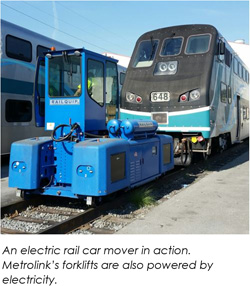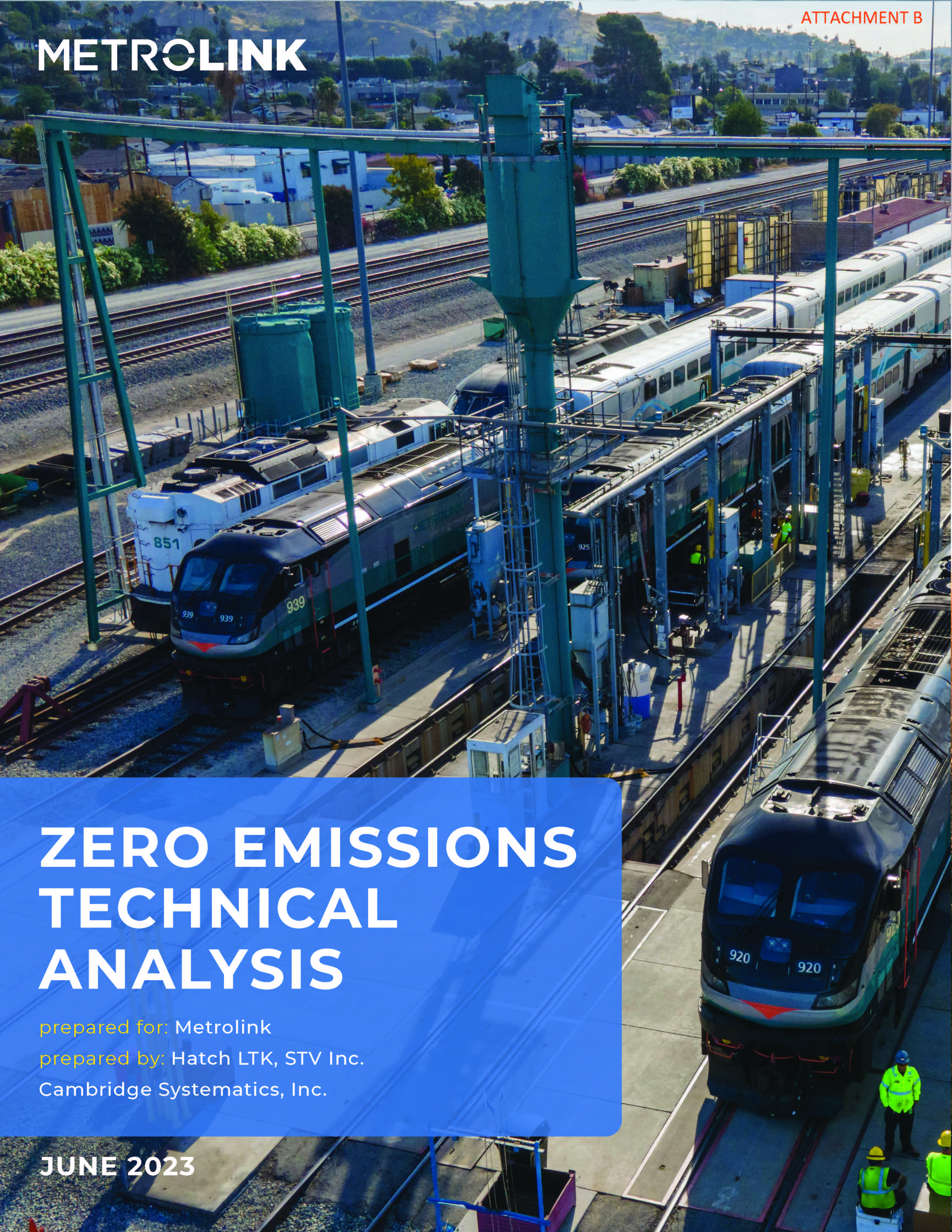Green Fleet
Road to Zero Emissions
Developments in zero emissions rail are ongoing and constantly evolving with frequent new partnerships and project announcements. In 2023, Metrolink completed the Zero Emissions Technical Analysis (Analysis), which evaluates the available zero emission (ZE) propulsion systems, vehicle types, operational and infrastructure impacts, project cost, safety, and regulatory considerations of implementing and operating a zero emissions rail vehicle. This Analysis captures the best and most accurate information available during the study period. Deployment of alternative propulsion vehicles has been limited in the United States. As a result, there are significant unknowns relating to the rollout of fueling and charging infrastructure, regulatory requirements, modifications required to maintenance facilities, necessary retraining of staff, and the required improvements needed to integrate smaller, lighter multiple unit vehicles into the legacy Metrolink system designed for heavy locomotive-hauled trainsets.
SBCTA Zero Emissions Multiple Unit (ZEMU)
The San Bernardino County Transportation Authority (SBCTA), one of Metrolink's member agencies, ordered the first hydrogen fuel cell-powered train in the United States to operate on the Redlands passenger rail project which connects the University of Redlands with the Metrolink San Bernardino – Downtown Station on a nine-mile extension of the San Bernardino Line. Service. The zero-emission vehicle is expected to be in service by 2024. This sets a new milestone for the United States rail sector in implementing zero emission technology and earned recognition of a 2020 Sustainability Award from the Southern California Association of Governments (SCAG).
Sustainability Awards 2020: San Bernardino County Transportation Authority from SCAG on Vimeo.
In partnership with LA Metro, Metrolink was awarded a grant for conversion of a rail multiple unit to zero emissions multiple unit (ZEMU) for use on the Antelope Valley Line in 2024. The pilot program will test new zero-emission technology with anticipated benefits such as cost savings, emissions reductions, travel time savings, and operational flexibility.
Tier 4 Locomotives
California Air Resources Board (CARB) awards Metrolink with a Tier 4 Verification Certificate for successful emissions testing in accordance with US Environmental Protection Agency’s highest standards.
Metrolink is proud to become the first commuter rail system in the nation to operate new locomotives powered by Tier 4 clean technology. Tier 4 locomotives are the cleanest diesel locomotives in the nation and reduce emissions by up to 85% compared to our older locomotives. They have two-thirds more horsepower and are equipped with the latest safety upgrades. A major milestone was achieved earlier this year when the final legacy Tier 0 locomotive was retired from service. That means that going forward, only Tier 2 or higher locomotives will be providing service on the Metrolink System, advancing closer to our goals of zero emissions. To learn more about Tier 4 Locomotives, click here.
Fuel Conservation Program
To reduce environmental impacts from the unnecessary burning of diesel fuel, we reduced train idling by 35% system-wide and by 50% at the Central Maintenance Facility (CMF). In addition to saving fuel, we reduced noise in surrounding communities.
Plug-In Program

Metrolink increased our electric plug-in stations by 55%, with the use of an electric train car mover to shuttle rail cars at CMF. This technology enables trains to run on electricity for a portion of their daily servicing and maintenance routine, rather than relying on diesel locomotive power, thereby reducing emissions. Also, electric forklifts replaced diesel forklifts, and Metrolink amended its policy on the activation of bells, cutting noise by 85%.
Less idle time means cleaner air. Auto-Engine Start/Stop (AESS) technology prevents excessive idling while reducing fuel use and emissions. Installation of AESS on Metrolink’s locomotives was funded in part by South Coast Air Quality Management District’s (SCAQMD) Carl Moyer Program, which focuses on cleaning the air by replacing older heavy-duty diesels with electric, alternative-fuel or cleaner diesel technologies.
Sustainable Vehicles
Metrolink’s 182 support vehicles include electric, hybrid, low-emissions and flex-fuel varieties. As part of our replacement program, we are committed to procuring fuel-efficient vehicles that meet our needs without imposing an excessive environmental burden.

